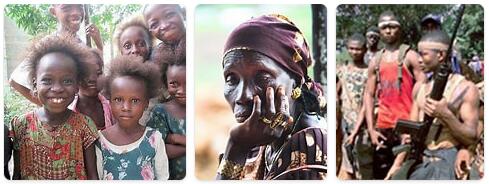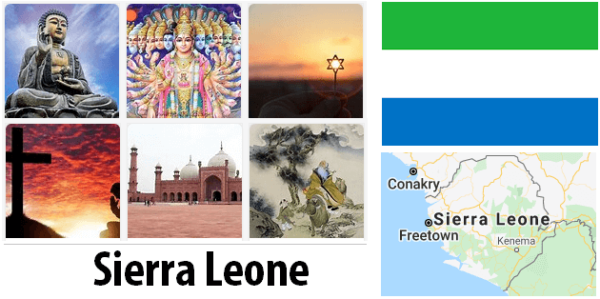The ethnic groups Temne and Mende are the two largest among Sierra Leone, and in addition the radicals Lokko, sherbo, limba, Sussu Fulani, Kono and Krio. The nationalists wanted to change the name of the country, which has little to do with the African languages. The country got its name from the Portuguese sailor Pedro de Cintra in 1462.
Three centuries later, Britain was faced with a peculiar “demographic problem” when hundreds of runaway slaves from the Caribbean arrived in London. While slavery was allowed in the colonies, it was banned in Britain, so it was decided to send the slaves back to Africa. Granville Sharp, the leader of the resistance to slavery, bought an area of 250 km 2 (for 60 pounds) for the chiefs of the various small groups. They built a small democratically organized farming community that quickly became the starting point for British conquest of the rest of the country.

The former slaves – the Creoles – were thrown into an area where they had no roots of their own, and they identified themselves more closely with European culture, looked down on the “wild” in the interior of the country and acted as middlemen for it. British colonialism.
Still, the “wild” resistance became long and fierce. It reached a climax in 1898 when their leader, Bai Buré, pledged an award to each Englishman’s scalp, and thus managed to raise the whole interior of the country to arms. Yet the British, with their superior military capabilities, succeeded in beating the “wild” after nearly a year of war.
Around the colonization in 1960, the British succeeded in reaching an agreement with the traditional leaders that enabled the British to defend their interests. Sir Milton Margai of the Sierra Leone Peoples Party became the first Prime Minister of the independent Sierra Leone in 1961.
The Creoles, together with the British and Syrian-Lebanese traders, controlled the economic power, but were now displaced by the political power. Still, they retained considerable influence over Margai’s government. Upon his death in 1964, he was succeeded by his brother Albert. Everything continued unchanged – or worse. The corruption and the scam reached such heights that some observers compared the country to Cuba under the dictator Batista. The production of diamonds gave rise to extensive smuggling and crime became the most frequent way to become rich.
The situation first changed in 1967 when All People’s Congress (APC), led by Syaka Stevens, won the election. The Creole conservatives, traditional leaders and British neo-colonialists joined forces to remove Stevens from power. They considered him “dangerously progressive.” Stevens was overthrown at a military coup and had to go into exile in Conakry.
But as early as April 1968, a group of lower officers conducted a military coup and reinstated Stevens at the prime minister’s post – the so-called “lieutenant coup”. In 1971, he cut off diplomatic relations between Sierra Leone and the United Kingdom, proclaimed the Republic and transformed himself into president.
According to thesciencetutor, Stevens nationalized the carpentry companies, gave the state a majority in the diamond mining company and joined the international iron and bauxite producer association, with the aim of obtaining higher prices for these raw materials.
In 1978, he conducted a referendum to transform the country into a one-party state. The aim was to abolish the constant clashes with the opposition. The proposal was passed and the APC assumed full government responsibility and absorbed the key political leaders from the SLPP.
From 1979, the signs of economic and political crisis became increasingly clear. Declining exports, inflation, deteriorating living conditions, rising authoritarian attitudes in society as well as the increasingly frequent corruption cases have caused the popularity of the Stevens government to fall dramatically.
